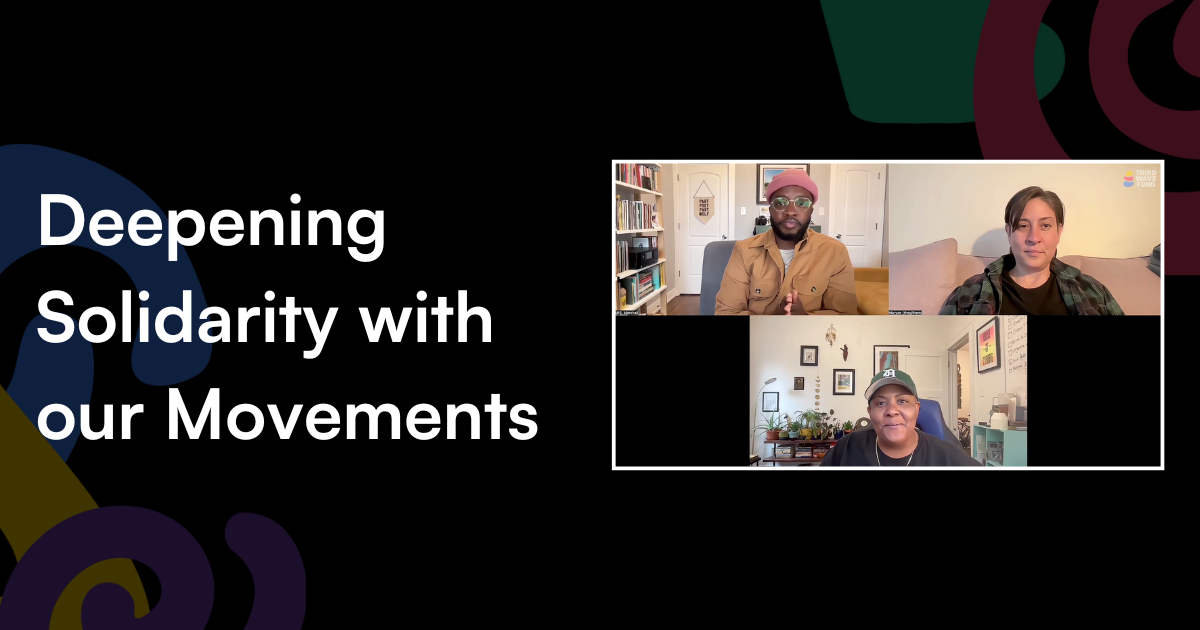Remaining Agile and Responsive as the Tides Turn

“Emergency” and “crisis” are all too familiar words to grassroots organizers seeking funding. And there is a difference between the two, and philanthropy needs to be responsive to both. As Program Officers for both rapid response and multi-year funding at Third Wave Fund, we believe that giving people multiple ways to be resourced allows them to confront the realities of change with confidence—let’s get into it.
As we shift into a new political landscape, yet recognizable conditions to our communities in which our movements are threatened, more funders need to be agile and provide various types of funding—like rapid response and multi-year—to contribute to an ecosystem of support and care. It may take some time, intentionality, and willingness to experiment, but years ago we made the space to have conversations about what we can do to better show up for our movements. We didn’t figure out a new financial system, currency, or develop a secret sauce—we just listened to what our grantee partners were saying. Through trial and error, we built out the strategy that continues to shape our work today.
We look to prison abolitionist and liberatory harm reductionist Shira Hassan, who distinguishes between movement’s “emergencies” and “crises” in a way that allows us to understand the necessity of immediate response to potentially life threatening events, while also tending to the overarching crises that shape our ecosystems.
Through the work of our Mobilize Power Fund, we support organizations facing unanticipated, time-sensitive opportunities, threats, or “emergencies” to their movement building work. When funders don’t want to commit to doing rapid response, it means that they have absolved themselves of having to confront the reality of a moment. They don’t have to see what’s coming up on the ground all the time.
Simultaneously, the Grow Power Fund and Accountable Futures Fund provide multi-year, unrestricted funding for grantees to grow, shift, and adapt in whatever ways they see fit – addressing the larger “crises” they are operating within. By committing to a long-term strategy, including a six-year contractual commitment through the Grow Power Fund, we not only create more financial stability for our grantee partners, but we foster a culture of trust. We trust that the groups we are funding know best what their communities most need.
The fear of doing both rapid response and long-term commitments that exists in a large part of philanthropy is actually an investment in a scarcity mindset that is not real. And when philanthropy says that providing unrestricted, long-term funding to queer, BIPOC-led organizations is “risky,” we say no, it’s necessary.
We prioritize unrestricted funding because that is where the magic happens. We encourage our grantee partners to scale up, dig deeper, shift strategies, or fail forward. Sometimes, long-term funding can even provide a dignified and intentional ending of a project, so others can emerge given shifting community needs. Groups may experiment with new strategies, or return to old ones – re-indigenizing their organizing work with cultural practices unique to their members.
When organizations are in perpetual crisis, it’s harder to respond adequately to emergencies. The cyclical and paralleled nature of emergencies and crises reminds us that revolution will take more than one tactic. We have and will continue to navigate the ongoing crises of racialized capitalism, hetero-patriarchy, and white supremacy, and emergencies are guaranteed to arise as we are surviving through them. It is philanthropy’s responsibility to be responsive and flexible as the tides continue to turn.
Philanthropy shouldn’t think that you have to choose between rapid response and long-term commitments, or that one is more impactful than the other. Whether you call it discerning the forest from the trees, distinguishing the blue of the sky from the blue of the ocean, or just simply seeing the big picture, we have learned over the years that our movements hold a multitude of truths, and require a multitude of care and support strategies—it is clear that “no one way works” on the path to liberation.
And—because we love a both/and—it’s important that we remember everyone doesn’t and shouldn’t have to be everything. There are funders who lead with rapid response funding and do it extremely well—shoutout to Emergent Fund and Urgent Action Fund. There are also funders like Kataly Foundation and Heising-Simons Foundation that, like us, focus on bolstering organizations through both one-time and multi-year funding. Ultimately, whether or not you can make various types of funding work at your institution, we encourage all funders to figure out how to be in relationship with others who utilize similar or different tactics—that’s where the ecosystem-building happens.
Third Wave funds through a gender justice framework, so of course we cannot slide into a binary where we’re either doing emergency response or long-term investments. Those two go hand in hand for us.

.png)
